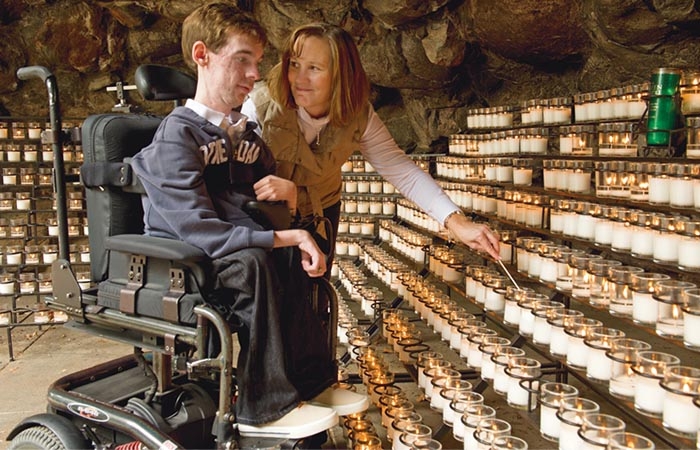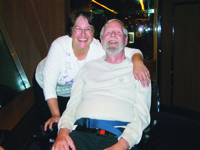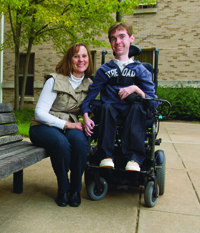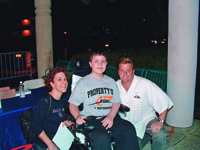
Caring for the Caregivers

Dedicated MDA family caregivers share best practices for supporting loved ones and themselves
“If I was down, who was going to take care of him?”
This question nagged at Josie Rose of Texas, as a lingering bout with the flu kept her from taking care of her husband, Rick, who at the time was living with amyotrophic lateral sclerosis (ALS). The flu that laid her flat also opened her eyes. She realized that she couldn’t do it all for him, not all the time anyway. So she finally asked their four adult children for help, and they began to pitch in. Their only question for Josie was, “How have you done all this by yourself?”
 According to the Family Caregiver Alliance, “A substantial body of research shows that family members who provide care to individuals with chronic or disabling conditions are themselves at risk. Emotional, mental and physical health problems arise from complex caregiving situations and the strains of caring for frail or disabled relatives.”
According to the Family Caregiver Alliance, “A substantial body of research shows that family members who provide care to individuals with chronic or disabling conditions are themselves at risk. Emotional, mental and physical health problems arise from complex caregiving situations and the strains of caring for frail or disabled relatives.”
The diagnosis
The first time supervisory clinical social worker Rebecca Axline, LCSW, meets a family with a newly diagnosed loved one at the MDA Clinic at Houston Methodist Neurological Institute in Houston, Texas, she says that the entire family often has the look of deer caught in headlights. They’re overwhelmed and they don’t know where to start, she says. So MDA and Axline help them do just that.
Her first step is to help them build a structure to better understand, and function in, their changing lives. “We as humans like our structures, our patterns,” she says. The families start by taking notes about everything they are learning. They may think they’ll remember everything, but with the stress of adjusting, even important details can be forgotten or misremembered; it’s only human, Axline reminds them.
The kinds of topics Axline discusses with newly diagnosed families include:
- information about diagnosis resources and background;
- how to go about establishing and managing insurance needs;
- age-appropriate issues and challenges (e.g., school for children or travel for adults);
- how to develop a family plan, including a list of other people to tell about the diagnosis and the level of detail that will be shared with each; and
- how to assess and plan for caregiving needs, today and over time.
 When family members will serve as dedicated full- or part-time contributors to a loved one’s care, Axline also recommends that these caregivers develop a coping system and/or network of support from the very beginning.
When family members will serve as dedicated full- or part-time contributors to a loved one’s care, Axline also recommends that these caregivers develop a coping system and/or network of support from the very beginning.
Smooth transitions
Family caregivers need to realize that every change or transition in their loved one’s life and medical condition will involve a two-step process, Axline says. The first step she calls “grief ambush,” which entails acknowledging to themselves that these changes are occurring and allowing themselves to feel the emotions that come with it. The second is asking themselves, “How do I manage this?”
Grief and stress often are part of big life changes whether or not you have a disability. But for people within the MDA community — both those with muscle disease and their family caregivers — the details are more challenging. For example, when a young person who has been seen in an MDA pediatric clinic reaches the milestone of being transferred to a transitions or adult clinic, that achievement is tempered by the anxiety of losing the team he or she has trusted and built relationships with for many years. Plus, there’s the challenge of developing trust with members of a new team. For family caregivers, the stress of moving to an adolescent or adult setting is at least as stressful as it is for the patient.
DeAnn Swinton of Southlake, Texas, understands this transition personally. When her son, Matt, who has spinal muscular atrophy (SMA), was applying to colleges, she wanted him to find a school close by, or at least in the state of Texas. He wanted to explore other options. When Matt was accepted at Notre Dame in Indiana, it seemed like an awfully cold and snowy place to send a young man who uses a wheelchair, DeAnn recalls.
As a parent, DeAnn wanted to protect Matt from going to a university so far away and in such a different climate, but she allowed him to make the decision. It turned out that
Notre Dame did a phenomenal job of working with Matt to modify his apartment to meet his needs, and Matt and his roommates and other friends built a support network that made the whole experience exceptionally good.
Matt, now 24, is a financial analyst at Sabre Holdings in Dallas. He lives with his parents, and DeAnn, as his primary caregiver, is experiencing the exquisite pull of having him be such an independent adult and allowing him to make his own adult decisions.
Self-care tips
 When the airlines tell you to put on your oxygen mask first in the event of trouble before helping others, it’s because they know that a person who doesn’t make sure he or she is OK is not going to be in any shape to help anyone else. The same rules apply to caregiving.
When the airlines tell you to put on your oxygen mask first in the event of trouble before helping others, it’s because they know that a person who doesn’t make sure he or she is OK is not going to be in any shape to help anyone else. The same rules apply to caregiving.
In Green Acres, Fla., Nadine Kirby realized that taking care of her son, David, who lives with Duchenne muscular dystrophy (DMD), meant that she and her husband, David Sr., needed to make significant lifestyle changes if they wanted their son to be able to continue living at home. They approached the problem with dedication and decided that the first step in caring for David Jr. was to take better care of themselves. So three years ago, they decided to embrace the so-called “Paleo lifestyle,” eating a protein-rich diet and foods that were available before early agriculture and make a commitment to getting more exercise. Nadine does power yoga and other exercise disciplines to gain strength, increase flexibility and reduce
stress — all of which makes her a better caregiver for David, she says. Regarding his diet, “David doesn’t need to lose weight, so we’re giving him a higher calorie health diet,” she adds.
Nadine and other family caregivers also stress that true, positive self-care means more than taking care of yourself physically; it also means developing a support network of friends or family members you can talk with openly and honestly and who accept you and your situation for what they are. They’re not the kind of people who ask how your husband is when he just gets out of the hospital and clearly only want to hear “fine” — forcing you to avoid that he’s actually using a respirator now.
Since not everyone in your life is able or willing to provide the types of support you need, Axline and the family caregivers featured in this story say it’s best to focus on those on whom you can depend.
Rewards, big and small
Because many neuromuscular diseases are progressive, caregivers can find themselves focusing on loss. However, there are times, occasionally a surprise and often the product of very hard work, when your heart just swells with happiness and pride. For DeAnn, one of those moments was when Matt graduated from Notre Dame. For other family caregivers, it could be as complex as helping a loved one take an ambitious vacation or as simple as receiving a heartfelt “thank you” in response to being there day after day.
From time to time, those on the receiving end of care feel guilt over keeping their caregivers focused primarily on their needs. Many care receivers will acknowledge this and encourage their caregiver to take a break now and then. When Rick Rose, who lost his battle with ALS in late 2012, would notice that Josie was getting frazzled, he’d tell her to go to lunch and a show with her friends and let her parents who lived with them stay with him during the time she’d be gone. When Josie’s dear friend suffered a loss, Rick had her get on a plane to visit that friend. Josie still remembers how touched her friend was by the support.
Of course, Rick, being the recipient of so much of Josie’s support himself, knew exactly the effect Josie’s presence would have on her friend.
This November, as we celebrate Josie Rose, DeAnn Swinton, Nadine Kirby and all family caregivers during National Family Caregivers Month, we should all remember the words of President Obama in last year’s presidential proclamation: “During National Family Caregivers Month, we thank these tireless heroes for the long, challenging work they perform behind closed doors and without fanfare every day, and we recommit to ensuring the well-being of their loved ones and of the caregivers themselves.”
No one wakes up one morning and knows everything about caregiving. It is a process and the longer you participate in the process, the more you will know about your own situation and the better you will be for yourself and the loved one in your care.
Streamlining Care
MDA’s myMuscleTeam is a free password-protected Web portal, powered by Lotsa Helping Hands, that allows individuals with muscle disease to coordinate their care needs and schedules with close family and friends. Family caregivers can post notes about their loved ones’ needs, whether it is transportation to a medical appointment or help with meal preparation and home maintenance, and work with their personal support system to find solutions in real time without the hassle of multiple emails.
Where to Begin?
If your child, spouse or another family member has been recently diagnosed with a neuromuscular disease, contacting your local MDA office is a great first step. MDA staff and experts at your MDA clinic can discuss the resources available in your area by diagnosis, medical management and more. Find your local office and clinic at mda.org/locate. And then connect with MDA and our extended community online via our Facebook page.
Caregiver Tips
Caregiving is a process and skill learned over time, so along the way remember to:
- develop your own coping system and network of support as soon as possible;
- acknowledge change and allow yourself to feel the emotions that come with it;
- embrace your loved one’s positive transitions toward new life experiences and more independent living;
- take care of yourself and your needs; and
- celebrate moments of success, big and small.
Resources
While MDA is an extraordinary resource for caregivers, these other organizations or programs are worth looking into:
- Administration on Aging National Family Caregiver Support Program
- Caring Connections
- Share the Care
- Family Caregiver Alliance
- Strength for Caregiving (AARP-supported; primarily for seniors)
Donna Albrecht is a freelance writer and speaker who lives with her family in Northern California.
MDA Resource Center: We’re Here For You
Our trained specialists are here to provide one-on-one support for every part of your journey. Send a message below or call us at 1-833-ASK-MDA1 (1-833-275-6321). If you live outside the U.S., we may be able to connect you to muscular dystrophy groups in your area, but MDA programs are only available in the U.S.
Request Information